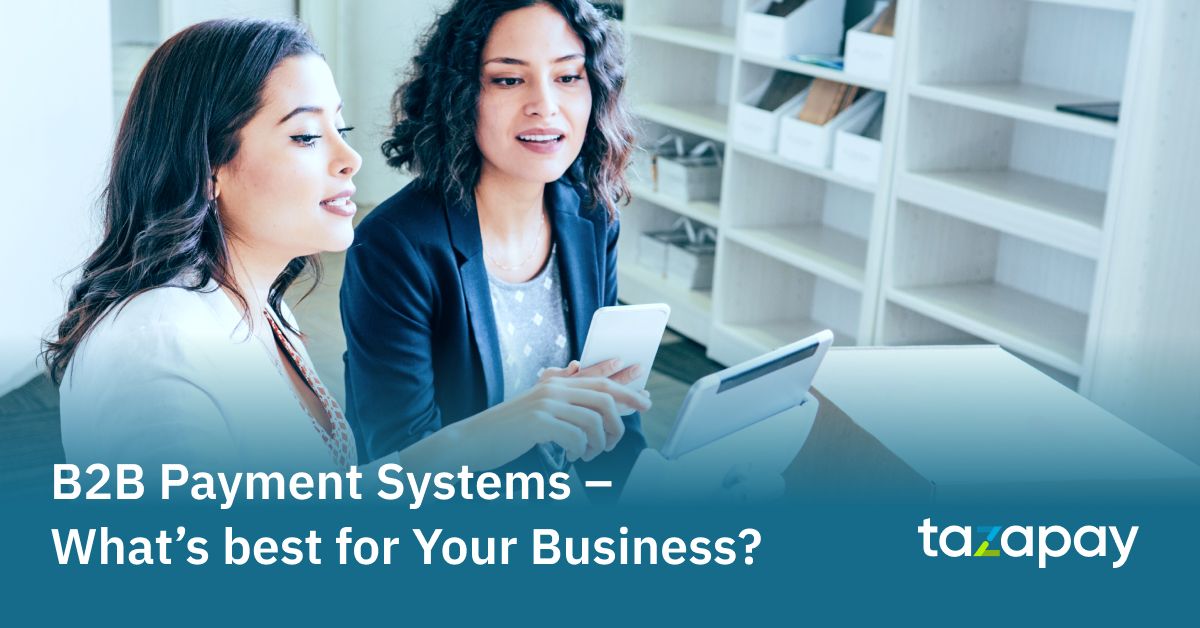B2B Payment Systems – What’s best for Your Business?

B2B (business-to-business) payments systems are vastly different from personal payments. When business entities and enterprises are involved in trade dealings, there is a sequence of negotiations and service fulfilments that need to be completed before payments are processed. These processes are different in different enterprises, and parts of the world. When it comes to international or global trade deals, it involves several financial entities such as international banks, payment gateways, and B2B payment facilitators. Let us take a look at the most popular B2B payment systems used across the globe before you decide which one works for your business.
Cheques
Cheques are a simple payment method often used by businesses. Despite the boost received by digital payment systems, many small and medium business units use cheque payments for B2B transactions. However, while quite common in domestic dealings, cheque payments pose several challenges when it comes to international trade. Physical cheques can be lost, damaged, or even forged, making them unreliable. Electronic cheques too come with many issues. A lack of trust and the unwillingness to encounter delays in clearance has started weaning most businesses away from cheque acceptance these days.
Credit cards
Like cheques, credit cards are popular for personal payments but not quite as much when it comes to B2B transactions. Credit card companies often charge a 3-4 percent fee for processing these transactions making vendors reluctant to use them. Buyers or importers too are dissuaded by the large fee imposed on delayed repayment of credit card bills. Still, small businesses are often willing to accept credit card payments if an alternative is unavailable. Read more on the pros and cons of using credit cards for B2B transactions here.
Wire transfers
Wire transfers, first introduced by Western Union, are not used by most businesses but are preferred by those making large sum transfers. These usually involve multiple banks and the cost of transfer is high but this is also a very secure mode of B2B payment.
Letter of Credit
A Letter of Credit is issued by the importer/buyer’s bank promising payment to the exporter/vendor upon delivery of goods and/or services. This method involves international financial institutions such as banks. You can find more details on letter of credit here.
Payment gateways
Several payment gateways such as PayPal, Square, Fundbox Pay, Plastiq, etc. have become popular these days. While a number of these are better suited to B2C payments, most of them facilitate B2B payments as well. However, very often they are not their primary use case, fees are high and the process can become particularly tedious in international transactions.
Escrow accounts
Online escrow payment platforms such as Omoney are increasingly gaining popularity because of their security features and their speed. Exporters and goods and services are paid for as soon as they are dispatched/delivered. The use of escrow accounts also assures new trade partners of the ability and intent to pay. Escrow charges are also among the lowest when it comes to B2B payment methods.
What is your pick?
The right pick from among the various B2B methods depends on the needs of your business. Various factors may influence your choice. These include -
- Availability – The availability of an LoC or cheque facility, for example, may influence the buyer or importer’s decision to use these methods.
- Cost – The processing fee or payment charges by the bank/credit card company/payment gateway may influence a business’ decision to incorporate it into the payment process.
- Payment Cycles – The lag or delay between the payment by the buyer and the receipt by the vendor is also a major factor to consider.
- Integration – With most businesses going the e-commerce way, integration of the payment method such as a payment gateway or online escrow services into the business portal or website is a major factor in current times. Many escrow accounts such as Omoney offer API integration making payment systems more secure and easy. The choice of B2B payment most suited to your business must come from a place of clear understanding of your business needs and ability to scale up operations. The post-COVID-19 age is one where most businesses have established an online presence and in such a scenario, online payment gateways and online escrow platforms have a clear advantage. Several escrow platforms such as Omoney also offer business verification services which may be quite advantageous when it comes to negotiating deals with new partners.
Category






